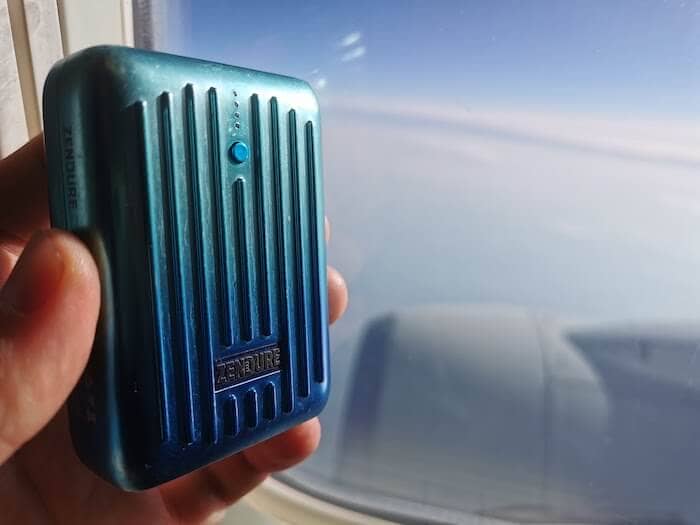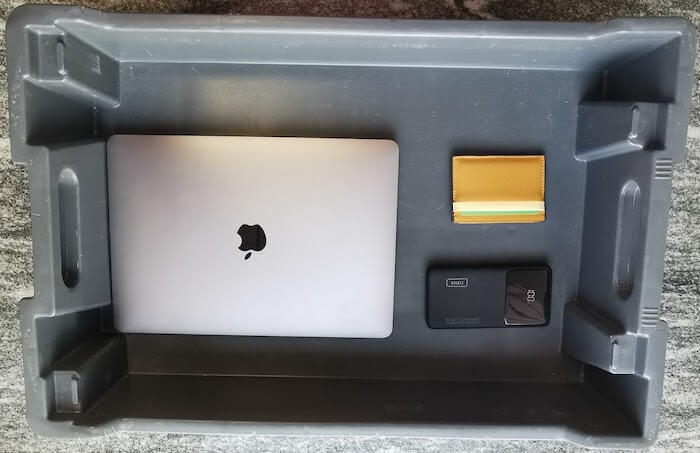
How to Find Out the Wh Capacity of Your Power Bank
The Wh value often is printed on the power bank, the product box, or the user manual. Wh is an abbreviation for watts per hour, the estimated energy consumption of electrical equipment for an hour. If your power bank does not provide this information, you may calculate it by putting the mAh and voltage into our Wh calculator.
Delta Airlines’ Policy on Other Types of Rechargeable Batteries

Personal Electronic Devices
Delta Airlines allows customers to carry personal electronic devices to the airplane, such as computers, cell phones, and tablets. However, you must bring them inside the cabin as carry-on luggage.
Importantly, when this is impossible, the devices should be turned off, secured from accidental activation, and properly packed. Additionally, the number of personal electronic devices that you may carry on board is limited to 15.
Hoverboards
Delta Airlines does not allow customers to transport hoverboards or other lithium battery-powered self-balancing personal transportation devices in checked or carry-on luggage.
Smart Luggage
Delta Airlines does not allow smart bags without removable batteries in checked baggage. However, if the battery is removable, you can bring it as carry-on luggage on the flight.
Furthermore, it is expected that you take out the batteries from the smart bag before boarding the plane. Also, to avoid any incidents, make sure you cover the battery terminals with plastic to prevent any short-circuits.
Damaged/Recalled Batteries
Delta Airlines restricts passengers from bringing defective batteries or items that manufacturers have recalled.
Spare Batteries
You are permitted to carry spare batteries in carry-on luggage. However, to ensure battery safety, Delta Airlines recommends that you place batteries in their original packaging before placing them in carry-on luggage.

If you don’t have the original packaging anymore, make sure to securely insulate battery terminals. Spare batteries should not be in direct contact with any other batteries or metal objects. Moreover, ensure that batteries are not squeezed into carry-on baggage and that no physical damage is likely to occur. Notably, no more than two spares between 100 and 160 watt-hours are permitted.
Also, Delta Airlines allows lithium metal batteries as long as each battery contains a maximum of 2 grams of lithium content.
Why are Airlines so Concerned with Batteries?
Battery cells that are damaged or degraded rapidly release their stored energy (potential and chemical), resulting in smoke, flames, flammable gas, and heat (up to 600°C and more), as well as fire and explosions.
Depending on the amount of electrochemical energy stored in a battery and the kind of battery (chemical and design), the total energy released is proportionate to that.
Thus, lithium batteries can cause fires through self-ignition and thermal runaway, as well as by igniting nearby flammable materials. These possibilities caused airlines to take precautions against batteries and only permit passengers to bring them on board.
These concerns prompted airlines to implement policies against batteries, such as permitting battery-powered gadgets exclusively in carry-on baggage. If an incident occurs in the cabin, passengers or the flight crew can see it and take appropriate action.
Conclusion
With the increase of personal electronic devices (PED) and the growing importance of batteries, we all have become aware of the dangers these items pose. Scientists and manufacturers took the necessary precautions to mitigate the risk; nonetheless, this was only achievable up to a point.
As a result, airlines and the Transportation Security Administration (TSA) enacted legislation governing how these gadgets should be transported on flights to guarantee passenger safety.
These rules should not be disregarded, as if a PED or spare battery catches fire in the cargo compartment, the airplane’s fire extinguishing system not be able to extinguish the fire, resulting in a disaster. If you’re interested in learning more about TSA restrictions, we recommend reading this article: Can you bring portable chargers on a plane? 3 TSA rules you need to know.
